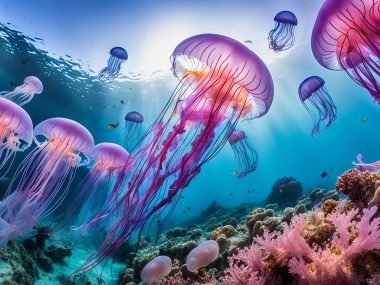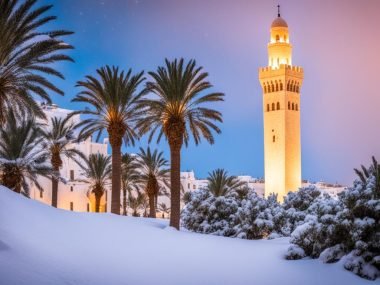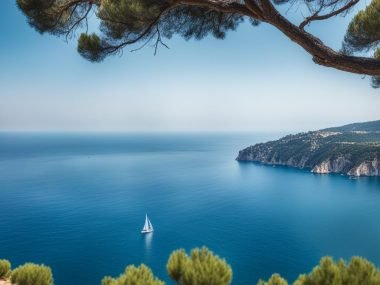Did you know Nigeria has a GDP almost ten times that of Tunisia? Yet, Tunisians have a 60% higher GDP per capita. This fact throws light on the economic differences between Tunisia and Nigeria. Nigeria’s GDP is a huge €452,971M. Tunisia’s GDP is much lower, at €43,991M.
But the story doesn’t end with these numbers. Tunisians earn an average of €3,587 each. Nigerians get less, with €2,123 per person. This shows not just the numbers but also what they mean for people’s wealth in both countries.
Key Takeaways:
- Tunisia has a lower overall GDP compared to Nigeria but enjoys a higher GDP per capita.
- Tunisians have a per capita income of €3,587, whereas Nigerians have €2,123.
- Nigeria’s economy is predominantly bolstered by its oil production.
- Tunisia faces economic challenges, including a higher debt to GDP ratio.
- Economic stability and income distribution are key factors affecting wealth disparity between the two nations.
Tunisia GDP vs Nigeria GDP
When we look at Tunisia and Nigeria’s economies, their GDPs tell us a lot. Tunisia had a GDP of €43,991M in 2022. Nigeria’s was much bigger at €452,971M. This big difference shows how their economies are not the same size. But, to really get the full picture, we need to see what kinds of work make money in each country.
Annual GDP Figures
Nigeria’s economy is really boosted by its oil production. It’s much larger than Tunisia’s. But, if we talk about Tunisia GDP per capita which is €3,587, things look different. Nigeria GDP per capita is at €2,123. This means, on average, people in Tunisia earn more money than those in Nigeria.
Key Economic Sectors
Looking at the Tunisia Economy vs Nigeria Economy, both countries have strong sectors. They are good at farming, using natural resources, and services. Tunisia also does well in making things and tourism. These are big earners for them. Nigeria relies a lot on oil. This makes its GDP go up a lot. But, oil prices change a lot, which can be risky.
| Metric | Tunisia | Nigeria |
|---|---|---|
| Annual GDP (2022) | €43,991M | €452,971M |
| GDP per capita | €3,587 | €2,123 |
| Key Economic Sectors | Manufacturing, Tourism, Agriculture | Oil Production, Agriculture |
So, even though Nigeria’s GDP is a lot bigger, looking at GDP per capita tells us more. It shows how people live in Tunisia and Nigeria. Understanding what each country is good at also helps us see their economy better.
Tunisia Economy vs Nigeria Economy
Let’s look at Tunisia and Nigeria’s economies. They are quite different from each other. These differences show how diverse their economies are.
Economic Structure
Tunisia’s economy is mixed with services, manufacturing, and mining playing big roles. The Tunisian dinar is very important for their economy. Yet, high unemployment is a big challenge for them.
Nigeria’s economy depends a lot on oil export. It’s a huge part of its GDP. The Nigerian naira is key for its economic activities. This oil reliance makes Nigeria’s economy sensitive to global oil price changes.
Growth Trends
Tunisia’s economic growth changes a lot. It’s been affected by politics and global economic issues. This is because its key sectors also keep changing.
Nigeria’s growth mainly follows the global oil market. When oil prices go up, Nigeria does well. But if oil prices drop, Nigeria’s economy struggles. This shows the risks of depending too much on oil.
| Indicator | Tunisia | Nigeria |
|---|---|---|
| Currency | Tunisian dinars | Nairas |
| Primary Economic Sectors | Services, Manufacturing, Mining | Oil Exports |
| Economic Vulnerabilities | High Unemployment | Oil Price Fluctuations |
Tunisia GDP per capita
Tunisia’s GDP per capita is €3,587. This shows that people in Tunisia, on average, earn more than those in Nigeria. It’s a key measure of the economic performance.

Income Distribution
Tunisia has a more even wealth distribution. This is important for comparing wealth differences between countries. Compared to Nigeria, Tunisia does a better job at sharing economic gains.
Comparative Analysis
Let’s compare Tunisia with Nigeria. Nigeria has a bigger GDP but a lower GDP per capita of €2,123. This means wealth in Nigeria is less evenly spread.
Nigeria’s wealth comes mainly from oil. However, not everyone benefits equally from it. This leads to a big wealth disparity between Tunisia and Nigeria.
- Tunisia’s GDP per capita: €3,587
- Nigeria’s GDP per capita: €2,123
| Country | GDP per Capita (€) |
|---|---|
| Tunisia | 3,587 |
| Nigeria | 2,123 |
In summary, Tunisia and Nigeria show clear differences in income and wealth. Tunisia, with a smaller population and higher GDP per capita, offers a more equitable economic situation. Despite Nigeria’s larger economy, its wealth distribution is not as fair.
Nigeria GDP per capita
Nigeria’s GDP per capita is €2,123. This shows us the big economic challenges Nigeria faces. These challenges greatly affect Nigeria’s economy.
Economic Challenges
Nigeria struggles with lots of poverty and no jobs. The economy is too dependent on oil money. Oil money is not always stable and causes problems for growth.
Also, too much corruption and slow work in government make things worse. This leads to bad use of resources. It also stops widespread growth in many areas.
Income Inequality
There’s a big gap between rich and poor in Nigeria. A few rich people have a lot of the wealth. This gap comes from unfair access to oil money.
Wealth doesn’t spread out because policies are not strong enough. Even with lots of oil money, most people don’t get richer. This is due to bad income spreading plans.
Wealth Disparity: Tunisia vs Nigeria
The Economic Comparison Tunisia Nigeria shows Tunisia’s higher GDP per capita means less wealth gap than Nigeria. When looking at income between Tunisia and Nigeria, the GDP per capita is key. Tunisians generally have more money than Nigerians, which shows a big difference in income levels.
Nigeria, despite its big GDP, faces a lot of wealth inequality. This is because it relies on oil and has different income policies. Both countries are affected by government actions and the world market. But, the Economic Comparison Tunisia Nigeria shows Tunisia has fairer income sharing. This study tells us about the economic health and big economic gaps between people in these countries.
| Country | Annual GDP (€) | GDP Per Capita (€) | Wealth Disparity |
|---|---|---|---|
| Tunisia | 43,991M | 3,587 | Lesser |
| Nigeria | 452,971M | 2,123 | Greater |
The table shows Tunisia’s higher GDP per capita and smaller wealth gap. Both countries have issues sharing wealth fairly. But, Tunisia’s economic system allows for more balanced income sharing compared to Nigeria. This Economic Comparison Tunisia Nigeria gives important insights on different wealth and income distribution, offering a deep look at their economic health.
Comparing Economic Stability
When we look at Tunisia and Nigeria’s economies, we see many important things. These include their deficit to GDP ratios, spending habits, and ratings from outside. Tunisia’s economy might seem weaker due to its high deficit and debt to GDP ratios. This suggests it has money troubles and is less stable.

Nigeria, however, faces its own problems like high inflation and not much variety in its economy. Still, it gets better marks from rating agencies like S&P and Fitch. These agencies think Nigeria is doing a better job at handling its money and debts. This shows how different Tunisia and Nigeria are when we talk about their economic stability.
Next, let’s look at the main points about how stable each country is:
| Indicator | Tunisia | Nigeria |
|---|---|---|
| Deficit to GDP Ratio | High | Moderate |
| Debt to GDP Ratio | High | Moderate |
| External Ratings | Lower | Higher |
| Inflation Rate | Moderate | High |
In our economic stability comparison, Nigeria seems more stable in some ways, according to agencies. But it’s not all smooth sailing for Nigeria. Tunisia, with its higher debts, needs to work on its money policy.
Social Indices and Quality of Life
Looking at social indices helps us see life quality in Tunisia and Nigeria. Each country focuses differently on health and education. This affects how people live in each place.
Health and Education
Tunisia spends a lot on health and education. This means better care and more people can read. So, Tunisia does better in health and learning than Nigeria.
Nigeria doesn’t spend as much on these areas. This leads to poorer health and fewer people learning. It shows why life in Tunisia and Nigeria can be so different.
Living Standards
Tunisia’s living standards are higher than Nigeria’s. People in Tunisia live longer. They also have fewer births and deaths, thanks to good health care.
Nigeria’s living conditions aren’t as good. Their health services and life span don’t match Tunisia’s. Even with a big economy, Nigeria still faces many challenges.
Comparing Tunisia and Nigeria shows how key investments improve life. It’s crucial for the well-being of their people.
Factors Influencing Wealth and Economic Performance
Tunisia and Nigeria’s wealth relies a lot on natural resources and their government’s decisions. Both have different resources that support their economies. But, the way they manage these resources leads to different results.
Natural Resources
Looking at Tunisia and Nigeria’s natural resources, we see big differences. Tunisia uses its oil and phosphate well, though it has less. Nigeria, with a lot of oil, greatly boosts its economy with it. Good management of these resources is key for both countries’ economic health.
Government Policies
Government decisions play a big role in Tunisia and Nigeria’s economic success. Tunisia has made many changes to secure its economy after the revolution. This includes efforts to lower public debt and protect its currency. Nigeria, though, struggles to make oil wealth help more people. Both need clear and fair policies to fix deep issues and grow economically.
Conclusion
Is Tunisia richer than Nigeria? This question needs looking at different economic signs. Nigeria has a bigger total GDP, making it a strong player. But, Tunisia shows better wealth sharing among its people when we see GDP for each person.
Looking at Nigeria and Tunisia, Nigeria’s wealth comes a lot from oil. But this wealth isn’t shared well with everyone. Tunisia, even with a smaller GDP, has less wealth gap. This shows it has more economic balance and stability.
When talking about things like health and how well people live, Tunisia is ahead. It spends more on health and schools. This leads to people there living longer and having better lives than in Nigeria. So, Nigeria might have more money overall. But, Tunisia could be seen as richer because its people have a better well-being.







